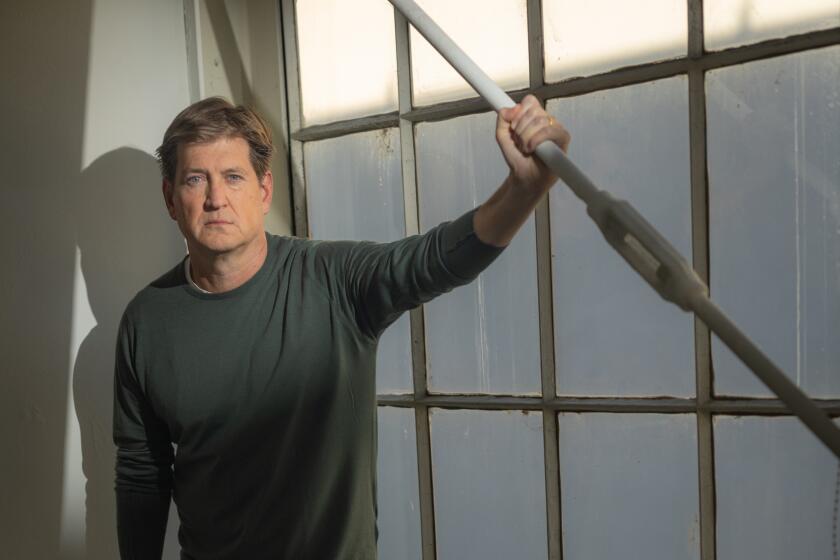STAGE REVIEW : Padua Hills ‘B’ Series Is Grade A
Colleague Albert Goldberg once noted that judging an evening of new music can be a process of “separating the chaff from the chaff.” It can be the same with new plays, especially experimental ones.
Certainly there was some chaff on Series “A” of this year’s Padua Hills Playwrights’ Festival at Cal State Northridge. Series “B,” though, is almost all wheat.
The only piece that doesn’t make a strong impression is John Steppling’s “The Theory of Miracles.” That’s because the author is still putting it together, trying to see if this speech works better here or there, and if more linkage is needed. Call it a prospectus for what could be an intriguing play. What draws people to a religious pageant in an age when God is supposed to be dead?
In contrast, Julie Hebert’s “Almost Asleep” is a finished work. Hebert takes off from the same place that Joyce did in Molly Bloom’s soliloquy: a woman drifting into sleep. But where Molly breathes with the tide, Hebert’s Linda is harassed and fragmented. Her mind runs off every which way.
In fact, it takes three actresses to pin her down: Mary Forcade, Patricia Mattick and Tina Preston. They wear identical pale-orange pajamas that have a slightly institutional look. And the set (a storage area at the college’s Art and Design Center) suggests a cell block. If Linda isn’t literally under guard, she is certainly on guard.
That’s one of her problems. She/they move around the space in the twitchy way of her grasshopper mind. That can be comical. But Linda has a real quarrel with her life, and we don’t dismiss her as a mere bundle of nerves.
Nor--once her story has come out--do we see her as an emblematic “abused woman.” She has been abused, but that’s not the central fact of Linda. This remains beyond reach, except perhaps in sleep, which she almost achieves at the end: the sleep of regeneration, not of death.
In other words, Hebert (she directed the piece as well) leaves some room for mystery. “Almost Asleep” is neither a simplistic political statement nor a facile style exercise. Its business is to track a woman trying to find the thread of her life, and it does so memorably.
Leon Martell’s “Kindling” is an engaging play set in a part of Vermont that doesn’t take kindly to Hollywood actors looking to get away from it all. The natives have enough troubles as it is. Without making archetypes of his Vermonters, Martell respects their dignity, and gives us a love story of sorts as well.
This is performed in a field at Northridge. Put a camera on it, and you’d have a charming TV play, of the sort that the American networks haven’t done for years, unfortunately. Martell was the director, and his cast is faultless--Leonard Donato as the lightweight from Hollywood, and Molly Cleator, Rick Dean and Jim Haynie as the locals, who know what it is to earn a day’s pay.
Maria Irene Fornes is a regular at the Padua Hills Festival. Her “Oscar and Bertha” is classic Fornes--batty, erotic, strangely beguiling. If Genet wrote comedies, they’d be like Fornes’ pieces.
In this one, we have a sister (Mary Forcade) and brother (Pamela Gordon) lusting after the same simple-minded maid (Molly Cleator), and it’s characteristic that Fornes puts the brother in a wheelchair and has him played by a woman. In the kind of family she writes about, gender is beside the point; it’s the rancor that matters.
Somehow Fornes can make the appalling look amusing--until you think about it. ‘Oscar and Bertha” needs trimming, but the play is there, and the company plays it like hilariously petulant fourth-graders. Again, the author directed--something that playwrights aren’t supposed to have the objectivity to do. Padua Hills founder-director Murray Mednick, a playwright himself, knows better.
Series “B” plays Saturdays and Sundays at 7:30 p.m., Cal State Northridge Art and Design Center, off Halsted Street. Closes Aug. 6. Tickets $15-$32. Information: (818) 885-3093. PADUA HILLS PLAYWRIGHTS’
FESTIVAL--SERIES B
Producing director Cheryl Bianchi. Production manager Bob Craft. Lighting Jason Berliner. Production liaison Jerry Abbitt. Stage managers Joe Zara, Johnnie Morello. Technical designer Ron Scarborough. Set designers Naomi Shohan, Erika Brich. Sound consultants John Acoca, Andrew T. Martin. Sound designer Pam Cederquist. The plays: Leon Martell’s “Kindling,” directed by Martell, with Molly Cleator, Rick Dean, Leonard Donato and Jim Haynie. Assistant Susan Hayden. Julie Hebert’s “Almost Asleep,” directed by Hebert, with Mary Forcade, Patricia Mattick and Tina Preston. Assistant director Kenn Norman. Assistant Wendy Thompson. Maria Irene Fornes’ “Oscar and Bertha,” directed by Fornes, with Molly Cleator, Laura Fanning, Mary Forcade and Pamela Gordon. Assistant Connie Monaghan. Music Stephen Heller, Valerie Gordon. John Steppling’s “The Theory of Miracles,” directed by Steppling, with Mick Collins, Kathleen Cramer, Taylor Donlan, Nick Flynn, Gill Gayle, Murray Mednick, Rachel Powell and Jack Slater.
More to Read
The biggest entertainment stories
Get our big stories about Hollywood, film, television, music, arts, culture and more right in your inbox as soon as they publish.
You may occasionally receive promotional content from the Los Angeles Times.










